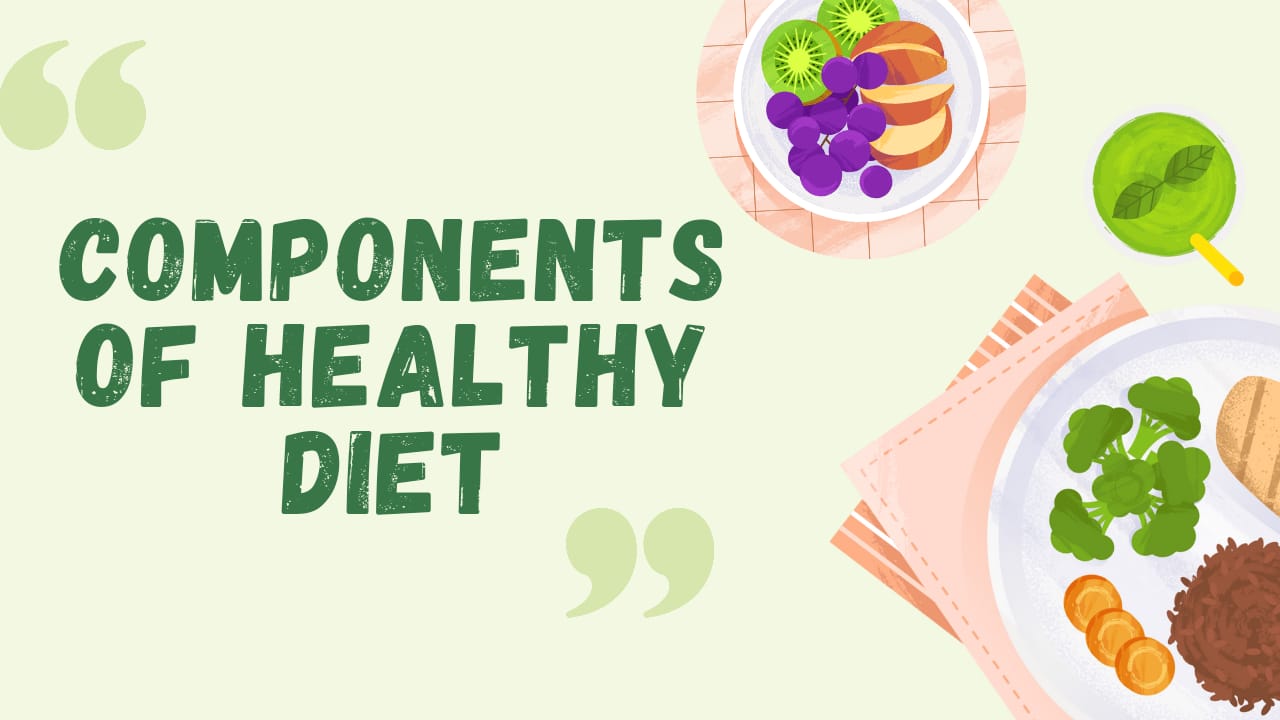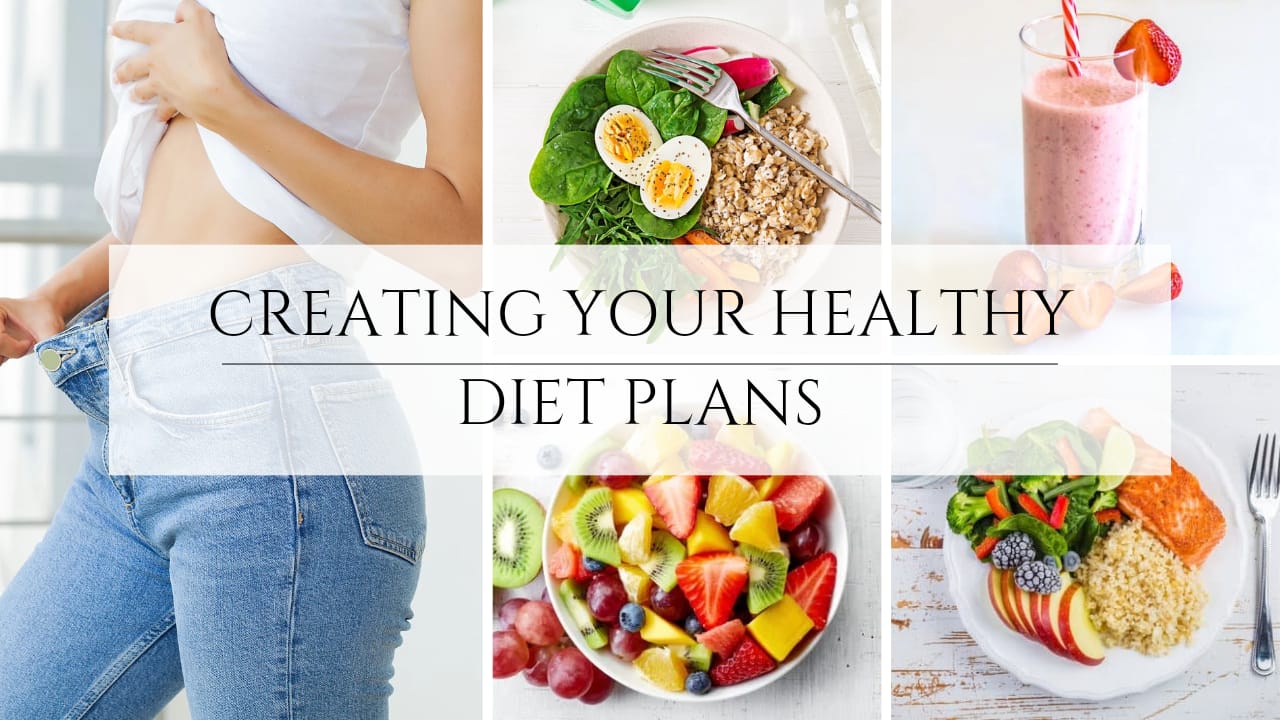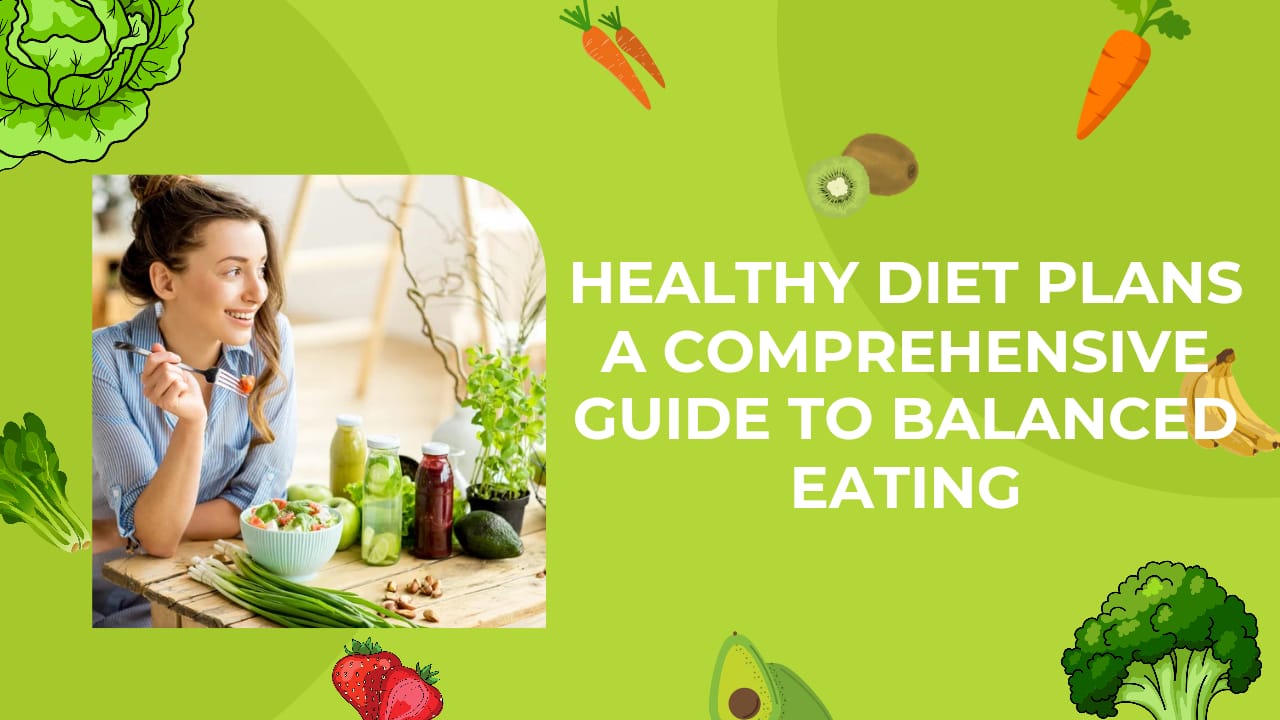A healthy diet is vital to maintaining general health, increasing energy levels, and helping to prevent chronic illnesses. With all the information available, deciding on the ideal diet appropriate for your lifestyle isn’t easy. This article will walk you through various healthy diet plans, providing practical suggestions to help you make informed decisions regarding your diet.
Why a Healthy Diet Matters
A balanced diet is the basis of healthy living. It supplies your body with vital nutrients, assists in maintaining an ideal weight, and lowers the chance of developing chronic diseases like heart disease, cancer, and diabetes. A balanced diet benefits both mental and physical health, boosts the immune system, and helps to prolong life.
Components of a Healthy Diet

Before looking into specific diet plans, it’s vital to comprehend the essential elements of a healthy and balanced diet. A balanced diet usually comprises:
- Fruits and Vegetables: These foods are high in vitamins, minerals, and fiber and should constitute a substantial portion of your daily intake.
- Whole grains: Instead of refined grains, choose whole grains such as brown rice, quinoa, or whole wheat bread.
- The Lean Proteins Integrate protein sources such as turkey, chicken, fish, legumes, and beans.
- Healthy fats: Choose unsaturated oils in avocados, olive oil, nuts, and seeds.
- Dairy and Dairy Alternatives: Choose low-fat or fat-free alternatives or alternatives made of plants such as soy or almond milk.
- Plenty of water: Staying hydrated is vital for all bodily functions.
Popular Healthy Diet Plans
There are a variety of diet plans designed to improve wellbeing and health. Here are some of the most popular ones that emphasize healthy nutrition.
Mediterranean Diet
It is believed that the Mediterranean diet is influenced by the habits of eating people from countries like Italy or Greece. It is a great source of fruits and vegetables, whole grains, olive oil, legumes, moderate amounts of poultry, fish, dairy products, and a small amount of red meat.
- The benefits: The diet has been linked to a lower risk of stroke, heart disease and certain types of cancer. It also has been linked to improved overall health of the brain and longer life.
- Tip: attention on fresh whole food, whole ingredients, utilize olive oil as your main fat, and enjoy your meals with family and loved ones.
DASH Diet (Dietary Approaches to Stop Hypertension)
Dietary guidelines for DASH were designed to reduce hypertension. It focuses on fruits, vegetables and whole grains as well as protein that is lean, and is devoid of salt, red meat as well as added sugars.
- The benefits: A diet known as DASH efficiently lowers blood pressure and decreases the risk of heart disease and stroke.
- Tip: Use herbs and spices instead of salt to flavor your food. Also, look for products with low sodium when shopping for groceries.
Plant-Based Diet
A plant-based diet is centered around the foods that are primarily made of plants, which include fruits and nuts, vegetables oils whole grains, legumes and beans. It could range from a vegetarian-based diet (including eggs and dairy) to a vegan-friendly diet (excluding meat products).
- Advantages The plant-based lifestyle is linked to a lower risk of hypertension, heart disease and type 2 diabetes and certain types of cancers. Additionally, it promotes weight reduction and environmental sustainability.
- Strategies: Ensure you get sufficient protein by incorporating many plant-based options like lentils, beans as well as tofu and quinoa.
Paleo Diet
It is believed that the Paleo Diet is founded on the food habits of our ancestors in the Paleolithic time period. It includes the consumption of lean proteins, fish as well as vegetables, fruits and nuts but does not include processed food items such as grains, dairy and legumes.
- Advantages It is a Paleo diet helps to lose weight, boosts blood sugar levels and can reduce the risk of developing chronic illnesses.
- Strategies: mindfulness on whole food items that are unprocessed and avoid refined or packaged products.
Low-Carb Diet
A low-carb lifestyle restricts carbs (like the ones found in sugary snacks like pasta, bread, and cakes) and focuses on proteins and fats. There are many kinds of low-carb diets such as the ketogenic diet which is low in carbohydrates, as well as that of the Atkins diet.
- Advantages Diets that are low in carbs may result in weight loss and increased blood sugar control and lower chance of suffering from heart disease.
- Tip: Choose healthy fats like olive oil and avocado and concentrate on vegetables that aren’t starchy as well as high-quality protein sources.
Flexitarian Diet
It is a Flexitarian diet is mostly plant-based, however it allows for the occasional consumption of animals and meat. It’s a versatile approach which focuses on eating plant-based and allows meat in moderate amounts.
- The benefits: The diet helps to lose weight, enhances health of the heart, and provides the advantages of a vegetarian diet, without the strict restrictions.
- Strategies: Start by replacing meat with plant-based food every few days as you gradually rise the amount of days that are vegetarian.
Intermittent Fasting
Intermittent fasting is a eating routine that allows you to cycle between having a meal and then fasting. Most common methods include using the method of 16/8 (16 8 hours fasting, eight hours eating) or the 5-to-2 method (eating normal meals for 5 consecutive days, and limiting calories for two days).
- Beneficial: Fasting intermittently can help to lose weight, rise metabolic health, and improve the length of life.
- Guidelines: Start with a shorter fasting time slowly rise this as the body adapts. Keep hydrated and consume nutrient-rich foods throughout your eating times.
Tips for Sticking to a Healthy Diet Strategy
Making a healthy diet plan is one thing, but sticking to it is a different. Here are some helpful tips to help you stick to your plan:
- Approach Your Foods: Meal planning can help you make healthier choices and stay clear of the temptations of last-minute. ready meals ahead of time and keep healthy snacks in your pantry.
- Practice portion control: Even healthy foods can cause weight acquire when consumed in large amounts. Make use of dishes that are smaller and aware of portions sizes.
- Pay attention to your body: Pay attention to the signals of fullness and hunger. Eat whenever you’re hungry, and stop when you’re full and not overstuffed.
- Keep hydrated: Sometimes thirst is confused with hunger. Drink plenty of water all day long to keep hydrated and beware of eating too much.
- Be flexible: Allow yourself the occasional indulgence without guilt. Moderation and balance are the keys to a healthy, sustainable diet.
Creating Your Healthy Diet Plan

The perfect diet program fits your lifestyle, preferences, and nutritional requirements. Here’s how to create your own
- Review Your Needs Think about your goals for health, diet preferences, as well as any medical issues you might be suffering from.
- Select the Strategy: Based on your requirements, choose the diet plan that is in line with your objectives. It doesn’t matter if it’s an Mediterranean diet to improve cardiovascular health, or an all-plant food plan for environmental reasons, select one that you like.
- Start small: Begin with gradual modifications rather than a complete overhaul of your whole diet. This will make it much easier to stick to your plan.
- Incorporate Variety Make sure your diet contains various foods to deliver all the essential nutrients. Explore various recipes and ingredients.
- Monitor Progression: Keep track of your feelings, energy levels, as well as any changes to your health. Modify the plan as necessary to keep moving towards your targets.
Conclusion
A healthy and balanced diet is an effective method to attain optimal health and well-being. It doesn’t matter if you opt for the Mediterranean approach, DASH diet, or plant-based diet, the most important thing is to choose a strategy that is a good fit for you and can be sustained over the long term. Through focusing on the right balance of nutrition, portion control and conscious eating, you will be able to benefit from eating a balanced eating plan as well as boost your overall health. Remember that it’s important to remember that the desirable way to eat is one you adhere to while enjoying a wide range of healthy, delicious foods. Begin making small changes today and you’ll soon be on the road towards a happier, healthier you.
FAQs
What is the best diet plan for weight loss?
The best diet plan for weight loss varies from person to person, depending on individual preferences, metabolism, and health conditions. Generally, a diet that focuses on whole foods, balances macronutrients, and is sustainable over the long term is effective for weight loss. Popular options include the Mediterranean, DASH, and low-carb diets.
How can I start eating healthier without feeling deprived?
Start by making small, gradual changes rather than overhauling your entire diet at once. Focus on incorporating more fruits, vegetables, whole grains, and lean proteins into your meals. Allow yourself the occasional treat in moderation to avoid feelings of deprivation and maintain a balanced approach to eating.
Is it necessary to count calories to maintain a healthy diet?
Counting calories can be helpful for some people, especially those looking to lose weight or monitor their intake more closely. However, it’s not necessary for everyone. Focusing on portion control, choosing nutrient-dense foods, and listening to your body’s hunger and fullness cues can also help maintain a healthy diet without requiring strict calorie counting.
What should I eat for breakfast on a healthy diet plan?
A healthy breakfast should balance carbohydrates, protein, and healthy fats. Some good options include oatmeal topped with fruits and nuts, a smoothie with spinach, banana, and Greek yogurt, or whole-grain toast with avocado and a poached egg. Aim for a combination of foods that will provide sustained energy throughout the morning.
Can I still enjoy my favorite foods while on a healthy diet?
You can still enjoy your favorite foods while following a healthy diet. The key is moderation and balance. Allow yourself occasional indulgences, but make healthier choices most of the time. Finding healthier versions of your favorite recipes or incorporating them into smaller portions can help you maintain a balanced diet.
